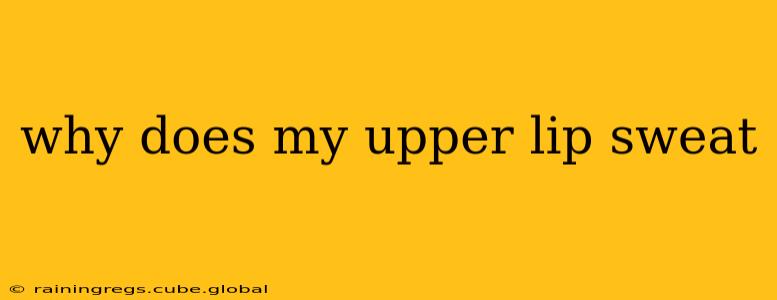Sweating is a natural bodily function that helps regulate our temperature. However, excessive sweating in specific areas, like the upper lip, can be embarrassing and disruptive. This condition, often referred to as hyperhidrosis, can affect various parts of the body, and the lip area is no exception. Let's explore the reasons why your upper lip might be sweating more than usual.
What Causes Excessive Upper Lip Sweating?
Several factors can contribute to excessive sweating on the upper lip. Understanding these can help you manage the condition more effectively.
1. General Hyperhidrosis:
This is the most common reason. General hyperhidrosis means you sweat excessively all over your body, and the upper lip is simply one of the areas affected. The exact cause of general hyperhidrosis isn't fully understood, but it's believed to involve the nervous system's overstimulation of sweat glands. This can be triggered by various factors, including:
- Stress and Anxiety: Emotional stress is a significant contributor to sweating in many people. The "fight or flight" response activates the sympathetic nervous system, leading to increased sweating.
- Hormonal Changes: Fluctuations in hormones, particularly during puberty, pregnancy, or menopause, can affect sweat gland activity.
- Certain Medications: Some medications list increased sweating as a side effect. Review your current prescriptions with your doctor.
- Medical Conditions: Underlying medical conditions like hyperthyroidism (overactive thyroid) can also cause excessive sweating.
2. Localized Hyperhidrosis:
This type of hyperhidrosis affects specific body areas, such as the upper lip, armpits, palms, or soles of the feet. The cause is often less clear than with general hyperhidrosis, but again, nervous system activity plays a crucial role.
3. Spicy Food:
Consuming spicy food can trigger increased sweating, including on the upper lip, due to the body's reaction to capsaicin, the compound that gives chili peppers their heat. This is a temporary effect and usually subsides soon after eating.
4. Hot and Humid Weather:
The body naturally sweats more in hot and humid weather to cool itself down. This is a physiological response and not necessarily a cause for concern unless it’s significantly excessive.
5. Exercise:
Physical exertion leads to increased body temperature, resulting in more sweating, including on the upper lip.
Is it a sign of a more serious condition?
While excessive upper lip sweating is often benign, it's important to consult a doctor if:
- The sweating is sudden and severe. A sudden onset of excessive sweating could indicate an underlying medical condition.
- The sweating is accompanied by other symptoms. Fever, weight loss, or changes in heart rate should be investigated by a healthcare professional.
- Over-the-counter treatments are ineffective. If you've tried various remedies without success, it's time to seek medical advice.
How Can I Treat Excessive Upper Lip Sweating?
Treatment options vary depending on the cause and severity of the sweating. Your doctor can help you determine the best approach. Some common treatments include:
- Antiperspirants: Clinical-strength antiperspirants containing aluminum chloride can help reduce sweat production. Apply these at night to clean, dry skin.
- Botox Injections: Botox injections can temporarily block nerve signals to the sweat glands, reducing sweating in the targeted area.
- Oral Medications: Your doctor may prescribe medications to reduce sweating, depending on the underlying cause.
- Iontophoresis: This treatment involves using a low-level electrical current to temporarily reduce sweating.
What if I'm concerned about my upper lip sweat?
Don't hesitate to schedule an appointment with your doctor or a dermatologist if your upper lip sweating is excessive, bothersome, or accompanied by other symptoms. They can help diagnose the underlying cause and recommend the most effective treatment plan. Remember, you're not alone, and there are solutions available.
